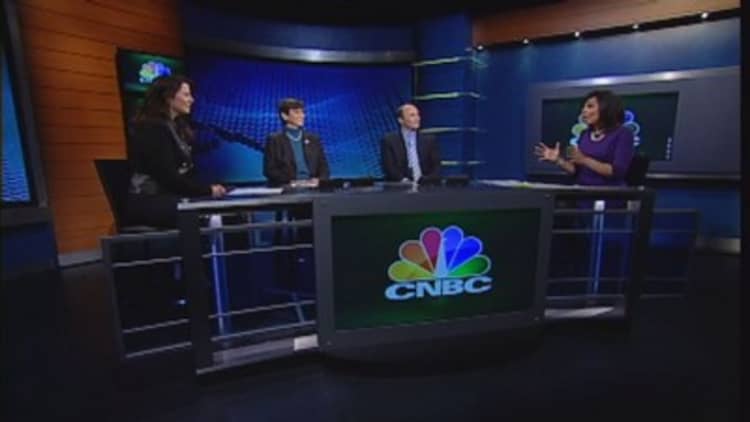
American workers are more confident in their ability to retire comfortably than they have been since before the financial crisis—not because they're better at planning, but because stock market returns and property values have climbed.
Retirement confidence has risen as stock market returns have climbed and property values have recovered, researchers and financial advisors say.
A new survey released Tuesday finds workers' retirement confidence has recovered from record lows of the past five years, showing a slight increase in 2014. However, that improvement in confidence is largely limited to higher earners and those with IRAs and 401(k)s.
(Read more: Survey finds ugly truth about Americans' savings)
Despite the improvement, retirement confidence is still relatively low: Eighteen percent of workers are now "very confident" that they'll have enough money to have a comfortable retirement—up from 13 percent in 2013—and 37 percent are "somewhat confident." Almost a quarter—24 percent—are "not at all confident", according to the Employee Benefits Research Institute's 24th annual Retirement Confidence Survey.
Yet most Americans haven't saved nearly enough money and have no idea how much they'll need for retirement.
More than one-third of workers and retirees—36 percent—have less than $1,000 dollars in savings and investments in their nest egg. Even worse, most are not taking action. Less than half of workers—only 44 percent—have done a calculation to find out how much they should be saving.
The reality is most Americans are not preparing for retirement, but those who do so often feel more confident.
"People feel better if they're participating in a 401k or other plan," said Greg Burrows, senior vice president for Retirement and Investor Services at the Principal Financial Group, one of the sponsors of the EBRI study.
"The key message is that people who are taking action are the ones that are feeling more confidence."
Not surprising, confidence was highest among top earners, nearly doubling among those with household income of $75,000 or above. Of those households, 36 percent said they were "very confident" about their ability to retire comfortably, compared with just 11 percent of those with incomes of $35,000 to $74,000. Only 7 percent of those with incomes below $35,000 were very confident in their ability to retire.
(Read more: Q&A: Should I pay off mortgage with my 401(k))

Those who were in a retirement plan were also more likely to be confident about their retirement. Workers who reported that they or their spouse have money in a contribution plan or IRA or have a defined benefit plan from a current or previous employer are more than twice as likely as those without any of these plans to be very confident, according to the institute's research director, Jack VanDerhi. Of those workers with a plan, 24 percent said that they were very confident in their ability to retire, compared with 9 percent without a plan.
The recovery in retirement confidence "is absolutely because of the stock market," said Ed Slott, founder of IRAHelp.com and the author of "The Retirement Savings Time Bomb and How To Defuse It." "It's a false confidence, which is more devastating than anything. Many workers have the same habits as they did after the 2008 crisis."
(Read more: Money moves you need to make now)
Those habits often do not include financial planning. Just because workers or their spouses have a workplace retirement plan or IRA does not mean they've spent much time calculating what they need to retire or how they should invest.
A recent survey by financial services provider TIAA-CREF found Americans spend more time choosing a restaurant, flat screen TV or tablet than planning for an IRA investment. More than one-third of those surveyed—and 45 percent of those ages 18 to 34—said they do not understand what an IRA is or the difference between an IRA and an employer-sponsored plan.
—By CNBC's Sharon Epperson. If you have a question for me, follow me on Twitter @sharon_epperson. Just tweet your questions about how to better manage, grow or protect your money at #GetAPlan. Or send an email to yourmoney@cnbc.com.


